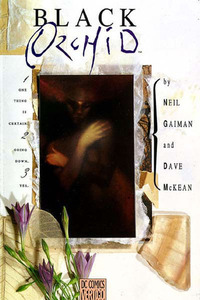You need to sign in or sign up before continuing.
Take a photo of a barcode or cover
3 stars for the story, 4th star for the incredible art.
Black Orchid is a collection of the three issue mini-series from the late 1980's. It features the re-imagining of an old DC character by writer Neil Gaiman and long-time collaborator, Dave McKean. This is one of their early collaborations and their first big commission for a major American publisher.
The plot surrounds the death and rebirth of Susan Linden, otherwise known as the crime fighting heroine, Black Orchid, who is investigating a criminal enterprise that would eventually lead to Lex Luthor. When Susan's ex-husband is released from prison, his dismissal by ex-boss Luthor, sets in motion a chain of events that sees him and Luthor hunting down the Black Orchid and her immature companion.
Although the book is now published by Vertigo, it was originally released by DC and pre-dates the Vertigo imprint by four years. Gaiman delivers an unconventional superhero story that does not feature much in the way of superheroics and creates an origin story for the Black Orchid that links her into DC's other plant-based heroes and villains - Jason Woodrue, Pamela Isley and Alec Holland. The story is about loss, unrequited love and the search for identity in an unfamiliar world. And while not having the majesty and breadth of his landmark Sandman series, it is still a beautifully told tale that is worth a read nearly 25 years after it was written. The art by McKean is fabulous featuring a photo-realistic style mixed in with some impressionistic renderings of the Green and the Amazonion jungle.
The book features some extra content for this deluxe printing that consists of sketches and handwritten notes from Gaiman as well as early comments from editor Karen Berger which while interesting are probably only of interest to hardcore fans of the character or Gaiman or those interested in the publishing process.
The plot surrounds the death and rebirth of Susan Linden, otherwise known as the crime fighting heroine, Black Orchid, who is investigating a criminal enterprise that would eventually lead to Lex Luthor. When Susan's ex-husband is released from prison, his dismissal by ex-boss Luthor, sets in motion a chain of events that sees him and Luthor hunting down the Black Orchid and her immature companion.
Although the book is now published by Vertigo, it was originally released by DC and pre-dates the Vertigo imprint by four years. Gaiman delivers an unconventional superhero story that does not feature much in the way of superheroics and creates an origin story for the Black Orchid that links her into DC's other plant-based heroes and villains - Jason Woodrue, Pamela Isley and Alec Holland. The story is about loss, unrequited love and the search for identity in an unfamiliar world. And while not having the majesty and breadth of his landmark Sandman series, it is still a beautifully told tale that is worth a read nearly 25 years after it was written. The art by McKean is fabulous featuring a photo-realistic style mixed in with some impressionistic renderings of the Green and the Amazonion jungle.
The book features some extra content for this deluxe printing that consists of sketches and handwritten notes from Gaiman as well as early comments from editor Karen Berger which while interesting are probably only of interest to hardcore fans of the character or Gaiman or those interested in the publishing process.
Cameos by Batman, Swamp Thing, Poison Ivy and probably others I didn't recognize. Beautiful drawings.
I liked how different the story was, how it subverted normal superhero-story expectations, especially with the ending. It was interesting and inventive and full of pretty and interesting pictures (Dave McKean, bravo as always). Would I have liked more after that ending, more stories featuring the Black Orchid and Suzy? Sure. But did I like where Gaiman let the story end? Yes. It was different and interesting and hopeful and mostly happy, which is unusual for a story with such a violent beginning. I liked the ending. I liked that it left me wanting more while simultaneously feeling like that was the best place to end things. Why do you make me feel such conflicting emotions, Gaiman?! :)
It's a comic book. If you like comic books and don't mind if the conventions of the genre are completely blown out of the water, you'll like this.
I really, really, REALLY want to like Neil Gaiman but I'm just not smart enough to understand his books. Flowers and humans and Batman and I'm all like... WTF Neil Gaiman!
I'm sure this is an amazing read and deep and wonderful but I still have no idea what happened.
I'm sure this is an amazing read and deep and wonderful but I still have no idea what happened.
I remembered reading a lot about Black Orchid when I read through the Sandman series last year, so I finally got my hands on a copy. This was really good, and while I'm not well-versed enough in the DC universe to totally get all of the cameos, I really enjoyed this book. I also haven't had a chance to see so much Dave McKean work in one place, and it was amazing. Definitely a good read, particularly if you like to take time out to really focus on the artwork.
While I'm a fan of Gaiman in general, this is not his best story. It's still lovely, imaginative and poetic, but it feels underdeveloped. Still, considering Black Orchid first came out in 1988, it should be no surprise that the author improved.
What elevates this book is Dave McKean's art. It's gorgeous, evocative and adds real depth to the story. I specially love the contrast of the black and white in man-made things versus the explosion of color in all natural elements.
Worth a read if you're a fan of either author or of great art in graphic novels.
What elevates this book is Dave McKean's art. It's gorgeous, evocative and adds real depth to the story. I specially love the contrast of the black and white in man-made things versus the explosion of color in all natural elements.
Worth a read if you're a fan of either author or of great art in graphic novels.




